| Srl | Item |
| 1 |
ID:
150551
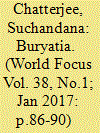

|
|
|
|
|
| Summary/Abstract |
The new narratives in Buryatia indicate both continuities and discontinuities—on the one hand there is an affirmation of Siberia’s Russian legacy and an understanding of multiple narratives of encounter and resilience. On the other hand, there is recognition of the mechanisms of integration in the Buryat space: be it a pan-Mongol domain, a shamanist tradition, or a Buddhist spirituality.
|
|
|
|
|
|
|
|
|
|
|
|
|
|
|
|
| 2 |
ID:
150548
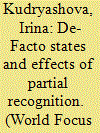

|
|
|
|
|
| Summary/Abstract |
Abkhazia and South Ossetia are the political units which have emerged as de-facto states in the wake of armed ethnical conflicts and were recognized as sovereign states by Russia (2008) and several other countries. Both polities belonged to a periphery of the Russian Empire and then of the USSR, and gained the Soviet experience of stateand nation-building.
|
|
|
|
|
|
|
|
|
|
|
|
|
|
|
|
| 3 |
ID:
150546


|
|
|
|
|
| Summary/Abstract |
While analyzing the theory of Eurasia, at the end of the 1920s as a new ideology of Russia after the 1917 October Revolution, the author arrives at the conclusion that at the present stage of the lawful development states in the globalizing world, Russia stands at a special stage of her development, i.e., she realizes her civilizational role, as well as her national identity. NeoEurasianism today is regarded as an ideology of restoring the integrity of the post-Soviet space on the basis of Slavic-Turkic integration.
|
|
|
|
|
|
|
|
|
|
|
|
|
|
|
|
| 4 |
ID:
150554
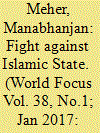

|
|
|
|
|
| Summary/Abstract |
Terrorism does not recognize borders and takes more and more inhuman forms spreading over new areas. Fight against international terrorism is one of the important national and foreign policy issue for Russia. The Russian Federation has been in the very center of the fight against this evil for the last two decades. On various occasion the policy makers in Russia stressed a ‘compressive approach’ associated with improvement of socio-economic conditions of the people to deal the terrorism.
|
|
|
|
|
|
|
|
|
|
|
|
|
|
|
|
| 5 |
ID:
150544
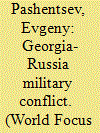

|
|
|
|
|
| Summary/Abstract |
Local armed conflicts that face the collision of interests of great powers usually lead to serious geopolitical consequences. In this case, the coverage of the events in mass media goes far beyond the countries directly involved in the conflict. The public assessment of the situation without doubt becomes a field of acute psychological warfare. The Georgia-Russia military conflict of 2008 was no exception in this respect. In spite of its short duration and the relatively small number of victims, it became the focus of international attention and was accompanied by a high level of confrontation in the information environment.
|
|
|
|
|
|
|
|
|
|
|
|
|
|
|
|
| 6 |
ID:
150556
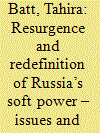

|
|
|
|
|
| Summary/Abstract |
Russia has often been seen as a country that relies mostly on its hard power tactics. It has also been seen as a country where democratic values are very low with lack of proper freedom of speech or expression. Russia has also been stereotyped as being involved mostly in espionage and nefarious activities as often portrayed through Hollywood movies and the Western press. This also proves the fact that while the negative image attached to Russia might be because of its own hard power pursuits but a lot is dependent on the way the West has portrayed it.
|
|
|
|
|
|
|
|
|
|
|
|
|
|
|
|
| 7 |
ID:
150535


|
|
|
|
|
| Summary/Abstract |
In the article one analyses the geopolitical processes connected with the reunion of Crimea with Russia and the local community integration into the Russian social and economic as well as political and legal framework. The Reunion of Crimea with Russia is interpreted as culture and historic as well as political precedent. There are revealed the peculiarities of the political and legal as well as social and economic development of the Crimea in the context of its influence on the social and political processes. One has analyzed the processes, conditioned by the reformatting of the authorities and changes in the system of the state administration in the Republic of Crimea. There have been identified the peculiarities of the constitutional process, activities of the public organizations and mass media, interethnic and inter-confessional relations.
|
|
|
|
|
|
|
|
|
|
|
|
|
|
|
|
| 8 |
ID:
150553


|
|
|
|
|
| Summary/Abstract |
The emergence of new geostrategic realities in the post-Soviet period has left tremendous influence on broadening Mongolia’s diplomatic outlook and the scope of its international activities. However, almost the whole period of 1990s saw stagnation in Mongolia’s relations with Russia though some scholars argue in favour of Russian interest in having not only “a friendly Mongolia but also a Mongolia strategically allied with Russia”.
|
|
|
|
|
|
|
|
|
|
|
|
|
|
|
|
| 9 |
ID:
150558


|
|
|
|
|
| Summary/Abstract |
The idea of Eurasianism has been an old one in Russia, the history of which can be traced back to the early years of the 20th century. As Mankoff (2009) explains, at a basic level, the concept means that ‘Russia’s fundamental identity, and hence foreign policy priorities, are linked to its geographical position at the crossroads between Europe and Asia.’ It asserts belief in the idea that Russia’s location puts it in a unique position to ascend as a great power while also laying claim to a unique civilization and ethos that is distinct from the Western civilization.
|
|
|
|
|
|
|
|
|
|
|
|
|
|
|
|
| 10 |
ID:
150531
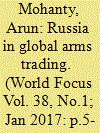

|
|
|
|
|
| Summary/Abstract |
21 st century began with strengthening of Russian position in the global arms market, notwithstanding the fact that arms trade in general declined in the world. President Vladimir Putin has described it as a stable tendency of Russians arms export. “We are expanding our position in Asia , particularly in South-East Asia. We are conducting successful talks for returning to the market of Latin America. We are continuing our cooperation with European partners on supply of new items, and on repair of military equipments supplied to these countries in the past.”, said President Putin.
|
|
|
|
|
|
|
|
|
|
|
|
|
|
|
|
| 11 |
ID:
150540


|
|
|
|
|
| Summary/Abstract |
Russia is one of the major players in global energy scenario. Hence an effort has been made in this article to highlight potentialities and production of energy resources with special reference to Gazprom; policies pursued to meet domestic needs and exports; issues connected with politics and economics of pipelines for energy exports. This article also contains analysis of case study of energy rich Caspian region.
|
|
|
|
|
|
|
|
|
|
|
|
|
|
|
|
| 12 |
ID:
150550
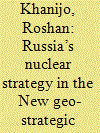

|
|
|
|
|
| Summary/Abstract |
In conclusion, what needs to be remembered is that the consolidation and reassertion of Russia’s geopolitical influence is taking place against a backdrop of new threats to national security that are of a multifarious and interconnected nature. Russia is pursuing an open, rational, and pragmatic foreign policy with the view of retaining and maintaining its sovereign interests. Russia’s long-term national strategic interests are aimed at strengthening the country’s defense by implementing military policy through strategic deterrence.
|
|
|
|
|
|
|
|
|
|
|
|
|
|
|
|
| 13 |
ID:
150545
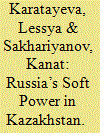

|
|
|
|
|
| Summary/Abstract |
The globalization promoting the growth of interdependence of states that makes relying on the “hard power” increasingly ineffective. Due to increase in competition for the spheres of influence and the capacity to involve individual states and regions in the sphere of one’s economic and political interests is still on the agenda. In this context, the concept of “soft power” has been becoming increasingly popular.
|
|
|
|
|
|
|
|
|
|
|
|
|
|
|
|
| 14 |
ID:
150552
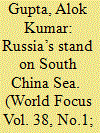

|
|
|
|
|
| Summary/Abstract |
South China Sea (SCS) conflict since July 2016 has been in international media spotlight quite frequently. Many experts of international politics are of the opinion that this dispute is fast turning into a hotbed of international politics. Some have been addressing it as a dispute with potentials to become flashpoint of another world war. China’s assertions and expansionist approach towards the SCS has invited protest by many of the small and big countries of the world.
|
|
|
|
|
|
|
|
|
|
|
|
|
|
|
|
| 15 |
ID:
150555
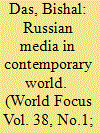

|
|
|
|
|
| Summary/Abstract |
The Russian state controls, either directly or through proxies, all five of the major national television networks, as well as national radio networks, important national newspapers, and national news agencies. The state also controls more than 60 percent of the country’s estimated 45,000 regional and local newspapers and other periodicals.
|
|
|
|
|
|
|
|
|
|
|
|
|
|
|
|
| 16 |
ID:
150543
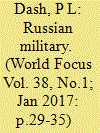

|
|
|
|
|
| Summary/Abstract |
Few countries in the world have the tradition of maintaining and sustaining a mighty military. Since the time of Peter the Great, Russia has an established military tradition of a great power. With the tide of time it has fought many wars; won some and lost others, but the tradition is transcendental and continues to inspire young Russians in the ethos of their military generals. The war with Napoleon in 1812, the Crimean War of the early 1850s, the Russo- Japanese war of 1905, the First World War of 1914-1918 and the Second World War of 1939-1945 are few of them.
|
|
|
|
|
|
|
|
|
|
|
|
|
|
|
|
| 17 |
ID:
150549
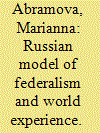

|
|
|
|
|
| Summary/Abstract |
The given paper examines the historical experience of the Russian model of federalism: its evolution from its emergence in 1918 to the present day. The author singles out peculiarities of the Soviet model of federalism, such as the absence of competition among the various subjects and the blossoming off national cultures. The new model of Russian federalism which emerged in 1991-1993 differed by its asymmetry, the complex structure of its subjects, budgetary federalism and other features. The author concludes that modernization of the existing model of federalism should proceed along the lines of strengthening the horizontal ties and infrastructures, since this will promote the evening out of the social-and-economic levels of the 85 subjects of the Russian Federation.
|
|
|
|
|
|
|
|
|
|
|
|
|
|
|
|
| 18 |
ID:
150557


|
|
|
|
|
| Summary/Abstract |
These few months have seen some exceptional forms of tables-turning in the political forecast of the very popular and widely followed US presidential elections. For a campaign that had lasted for nearly 597 days1, the results of Donald Trump as the next US president came out as a complete surprise for it defied almost all the political opinions and surfaced a complete new-comer to politics with zero experience in the political field who assumed the most powerful office in the world.
|
|
|
|
|
|
|
|
|
|
|
|
|
|
|
|
| 19 |
ID:
150547


|
|
|
|
|
| Summary/Abstract |
Semi-presidential systems develop under the following conditions: if the party system is weak, if the constitution inherits elements of the previous non-democratic system; if strong executive power is required. Weak party system and underdevelopment of political parties encourage personification of party leaders and the presidents, thus the president may place themselves above parties (like Boris Yeltsin did). Personalism becomes the reason for and the consequence of the weak party system, weak parliament and weak democracy.
|
|
|
|
|
|
|
|
|
|
|
|
|
|
|
|